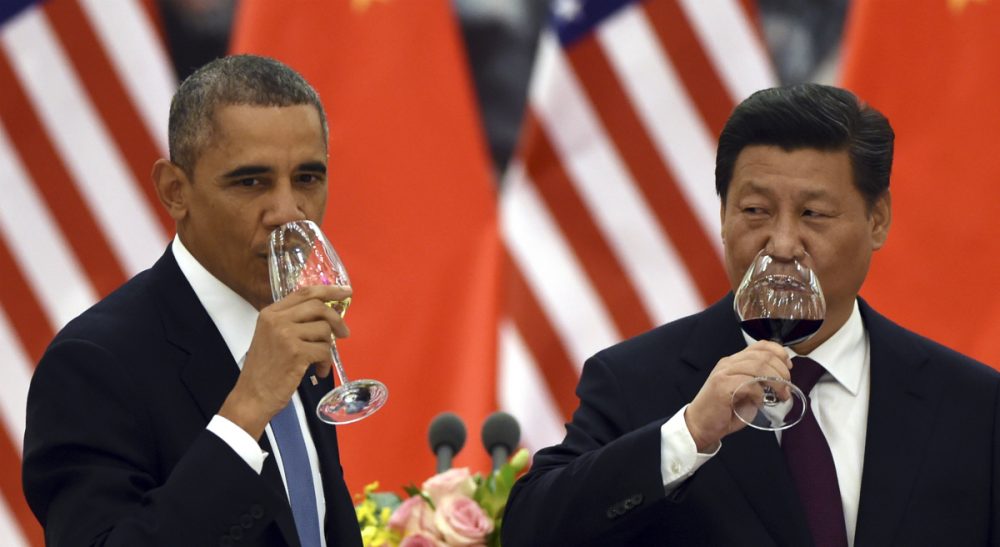Advertisement
Why It Matters That The World's Two Biggest Polluters Forged A Climate Accord

On Tuesday, Nov. 12, President Obama and President Xi Jinping of China announced a climate accord that demonstrates real promise in making progress to stem global climate change. The climate accord also represents something that is rarely achieved in the struggle to come together around environmental issues: a long-term agreement that meets the interests of both parties; lays the groundwork for future actions by other key players; fundamentally changes the strategic negotiation game; and takes substantial steps toward solving the problem of collective action.
...the United States and China are re-setting expectations, signaling to other nations not only the urgency of the problem of climate change, but also the imperative that other countries also do their part.
For President Obama, the climate accord agreement was a well-timed foreign policy win in the wake of a resounding defeat in this month’s midterm elections. As he faces the prospect of being a lame duck president, stifled by opposition in Congress to any initiatives he has yet to push, President Obama was able to announce the triumphant outcome of months of complex talks that he and members of his team had been tirelessly, yet quietly, pursuing. Regardless of the challenges ahead, the president’s negotiation victory reinvigorates his presidency and adds to his personal legacy.
For President Xi Jinping, the accord represents a shift away from the foot-dragging, non-committal approach China has been taking on climate change. By negotiating directly with the United States and framing this high-profile deal as an example of the types of emissions cuts other countries should model, President Xi is helping his country make a strong, unambiguous statement to the rest of the world: China is the other global superpower along with the United States. The United States’ alliance with China on this issue by no means negates the competition between the two countries in other areas, but it is an implicit acknowledgment that China, as a stakeholder whose support is necessary for meaningful change to occur, has achieved a status in the global economy and the geopolitical landscape that, in many senses, equals that of the United States.
The low-profile, bilateral approach that led to this climate accord flies in the face of standard “interest-based" negotiation advice, in which all stakeholders have a seat at the table. The goal of such negotiations is an agreement that meets each party’s interests. China and the United States are by no means the only stakeholders in the problem of global climate change. They are the two largest polluters in terms of carbon emissions, but the number of absent parties at the negotiating table might seem to doom the success of the agreement, or at least significantly limit its impact.
But viewed another way, this landmark agreement between two of the biggest emissions offenders sets the stage for a larger and more constructive multilateral consensus-building effort ahead of the 2015 U.N. Climate Change Conference in Paris. By working out their substantial differences and producing an ambitious agreement ahead of the conference, the United States and China are resetting expectations, signaling to other nations not only the urgency of the problem of climate change, but also the imperative that other countries also do their part.
Absent this new bilateral agreement, the outcome in Paris next year might well mirror that of Copenhagen in 2009, where developing and developed countries formed blocking coalitions against each other. The Copenhagen talks failed in great part because competing narratives about who caused climate change devolved into blaming and name-calling. Some nations claimed that others were more responsible for causing climate change and, therefore, more responsible for arresting it.
Advertisement
...sometimes, inclusivity and consensus-building are the wrong way to go. Sometimes, what’s really needed is getting the big players into the room and getting them to do something to shake things up.
The landmark agreement between the U.S. and China resets the negotiation table for Paris in 2015. The mere fact that the U.S. and China, the two countries most emblematic of developed and developing nations, are now on the same page, will be a game changer. Neither can use the other as a scapegoat. And with the breadth of the agreement, the rest of the world will have to drop the tired trope of assigning blame in lieu of accepting responsibility.
In many cases, negotiation theory argues for broad stakeholder assessment and long, arduous consensus-based processes. But sometimes, inclusivity and consensus-building are the wrong way to go. Sometimes, what’s really needed is getting the big players into the room and getting them to do something to shake things up. Thanks to semi-secret negotiations and a bilateral agreement that cut out most of the stakeholders (and therefore the business-as-usual blame game), traditional coalitional dynamics will no longer apply in Paris, and a new page is turned for future climate change negotiations. We don’t know what will come of the next round of negotiations, but we do know it will be different from the past. That, in itself, is a breath of fresh air.

This piece was co-authored by Sara E. del Nido, a clinical fellow at Harvard Law School in the Harvard Negotiation & Mediation Clinical Program.
Related: